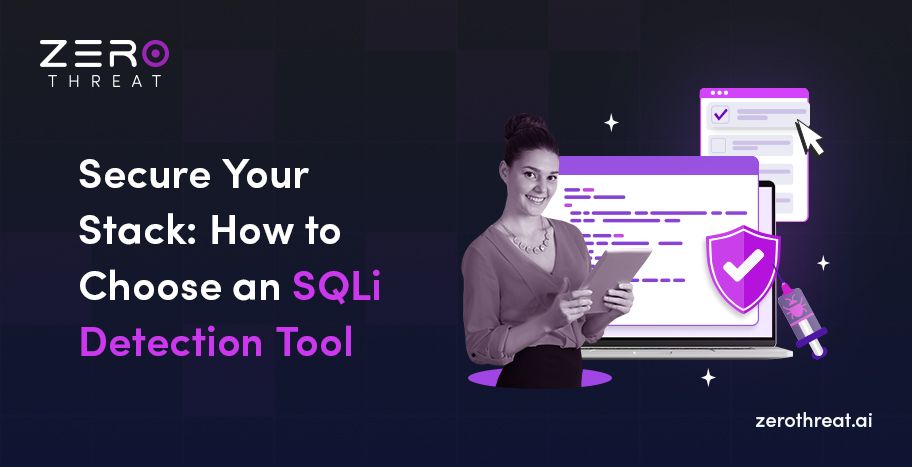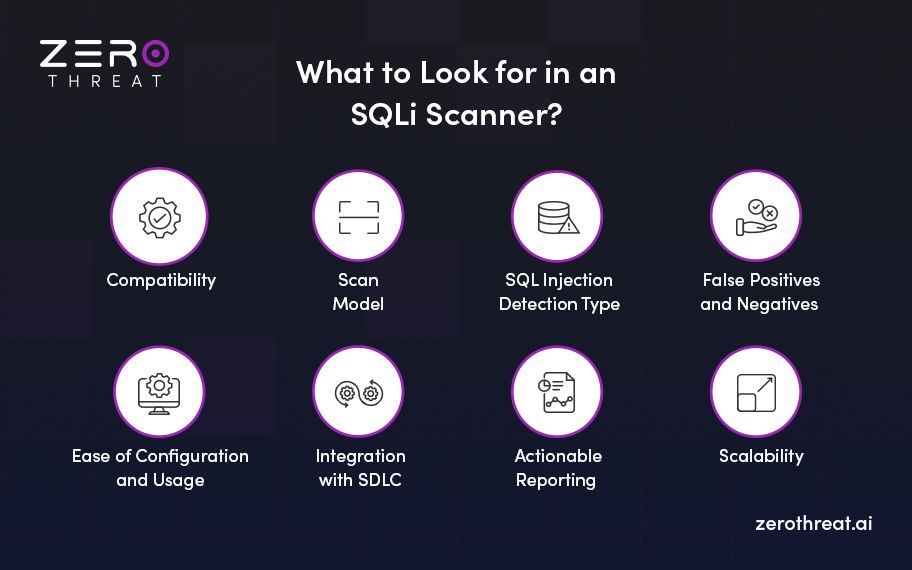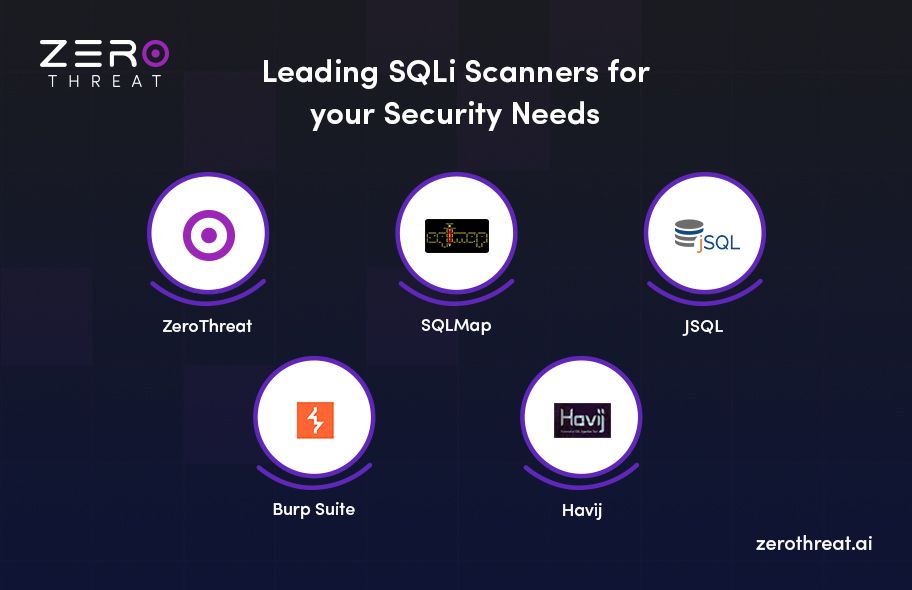All Blogs
8 Tips to Choose SQL Injection Scanner for Your Tech Stack [Expert Recommended]

Quick Summary: Explore the essential considerations for choosing an SQL injection scanner that aligns with your tech stack. This will help you understand what you need to look for when it comes to choosing a vulnerability scanner for SQL detection. Also, check the list of the best SQL scanners for tech stack to test your web app and discover the vulnerability.
In today's fast-paced tech world, frequent code changes and releases are the new normal. While these changes enable businesses to stay abreast of the market dynamics, AppSec struggles to keep up with the pace. Unfortunately, this ends up with the applications and APIs being susceptible to security issues like SQL injection, cross-site scripting, broken authentication, weak session management, etc.
SQL injection remains a persistent nightmare for developers and security teams alike as it is one of the top security risks as per OWASP top 10. However, identifying and resolving SQL injection vulnerabilities requires the right scanner that precisely identifies the vulnerability and is compatible with your tech stack.
In this blog, we are going to discuss the key considerations for choosing an SQL injection vulnerability scanner for your tech stack. This will help you pick the right scanner to uncover SQL injection vulnerabilities in your web app while it also aligns with your existing tech stack.
Unlock Advanced AppSec Capabilities with ZeroThreat’s Next-Gen DAST and Test for Real Vulnerabilities - No Bluff, Super-fast Testing! Explore the Pricing Plans
On This Page
- Considerations for Choosing SQL Injection Vulnerability Scanner for Your Tech Stack
- Top SQL Injection Vulnerability Scanners Available in the Market
- To Wrap Up
Essential Factors to Consider When Choosing the Right SQL Injection Scanner for Your Tech Stack
Choosing the right SQL scanner is essential to safeguard your application and ensure data integrity. This section explores the essential considerations for selecting an ideal SQL injection scanner that aligns with the tech stack your application is using.

Compatibility
One of the most crucial considerations for choosing an SQL injection vulnerability scanner is compatibility with your tech stack. Different businesses prefer different programming languages, frameworks, databases, and other components.
So, key factors to consider for compatibility include:
- Programming Languages: Check the underlying programming language and framework that your application is using to ensure compatibility. For example, your application may be built on Java, Python, PHP, Ruby, .NET, etc. It is advisable to check whether the scanner is capable of detecting vulnerabilities in your app built on a specific programming language.
- Framework: Consider the framework your application is using to choose the right SQL injection detection tool. There are different frameworks like Angular, React.js, Ruby on Rails, Django, etc. By ensuring that the SQL injection scanner you choose is compatible with the framework of your app will ensure quality testing with tailored assessment.
- Database: SQL injection targets your database, and if the scanner you choose isn’t compatible with the database, it’s good for nothing. There is a wide range of databases like MySQL, PostgreSQL, MongoDB, Oracle, MariaDB, SQLite, etc. Check if the scanner you want to choose supports the database your application uses.
- Web Server: The tech stack of a web application includes the web server that hosts the application’s data and resources. If the SQL injection scanner is not compatible with the host web server, you will not be able to perform scans efficiently. Different web servers require distinct configurations, behaviors, and compatibilities. So, the performance and accuracy of the scanner may not be up to the mark, if it doesn’t support the server.
- Operating System: In most cases, Linux is the host operating system for applications. However, many applications may use other OSs as well, and your scanner should be compatible with it to efficiently scan the application and detect vulnerabilities.
Scan Model
There are different types of security testing methods, like static and dynamic testing. Every method offers a different technique to assess web applications for potential vulnerabilities, as mentioned below.
SAST
SAST (Static Application Security Testing) is a white box testing method in which the source code, binary, or bytecode is analyzed to identify critical vulnerabilities. Since it’s a static assessment, the test isn’t performed while the application is running and helps uncover weaknesses in the early stages. Usually, SAST tools are integrated into the coding tools to detect vulnerabilities in real time at the time of coding.
DAST
Dynamic Application Security Testing (DAST) is a black-box method in which a tester doesn’t know the internal workings of an application. DAST tools analyze applications from outside while they are running. This method is more reliable when it comes to security testing because it offers a more accurate assessment with fewer false positives compared to SAST. It identifies vulnerabilities that arise when your application is deployed in production and running, such as SQL injection, cross-site scripting, CSRF, etc.
IAST
Interactive Application Security Testing (IAST) is a combination of both DAST and SAST. So, this method is capable of identifying runtime vulnerabilities as well as code-specific vulnerabilities. This hybrid approach to security testing enables you to perform comprehensive assessments and offers real-time alerts. It offers a more accurate assessment, and lower false positives compared to DAST and SAST.
SQL Injection Detection Type
There are different types of SQL vulnerabilities with varied impact and risk factors. A comprehensive SQL injection detection tool will cover all these types of vulnerabilities to offer complete protection against injecting malicious SQL commands.
- In-band SQLi: In this type of SQL injection, the attacker uses the same channel to launch an attack and receive its results. It is of two types - error-based SQLi and Union-based SQLi. Error-based SQLi occurs when error messages reveal sensitive database information that allows attackers to carry out attacks. On the other hand, Union-based SQLi occurs when an attacker can exploit the UNION attribute of SQL statements that combine results from multiple SELECT statements.
- Out-of-band SQLi: This type of SQL injection involves an attacker using different channels to initiate an attack and receive the outcomes. Out-of-band SQLi is hard to detect due to the use of many channels. Look for a tool that can detect out-of-band SQLi vulnerabilities precisely.
- Inferential SQLi: It is also known as blind SQL injection. Inferential SQLi is a method in which an attacker cannot see the results of an attack. There is no direct way to know the result, but an attacker can infer it from behavioral aspects like the response time, different responses, etc. It includes Boolean-based SQLi – an attack technique in which the attacker checks the subtle response by an application to conditional statements. Time-based SQLi is also based on inference, but it involves time. The attacker checks the response time of the server.
False Positives and Negatives
Often vulnerability scanning tools flag non-existent vulnerabilities that are known as false positives. Similarly, a correct vulnerability may escape detection, and it is known as a false negative. It is an important consideration when it comes to selecting an SQL injection scanner.
An ideal vulnerability scanner for SQL injection minimizes both false positives and false negatives to offer accurate results. Too many false positives result in alert fatigue and wasted effort. So, focus on selecting a SQL injection scanner for the tech stack with lower false positives and negatives.
Ease of Configuration and Usage
A tool that requires much of your time in configuration and settings isn’t an ideal solution to identify and resolve SQL injection vulnerabilities. Such a tool will increase the overall time in scanning and detection. Therefore, you should choose an SQL injection scanner that is user-friendly and intuitive.
Besides, avoid the SQL injection detection tool with a complex setup to speed up the process. It requires additional steps that will affect your AppSec process.
Integration with SDLC
Make sure that the SQL injection scanner you choose easily integrates into your continuous integration/continuous delivery (CI/CD) pipeline to perform automated testing within SDLC. This will ensure that testing is performed after every build is completed.
Testing at build time ensures early detection and mitigation of vulnerabilities, reducing the chances of cyberattacks post-deployment. Your dev team can deliver more secure code to production after the integration of the right SQL injection tool into SDLC.
This early detection and prevention of vulnerabilities builds a stronger security posture to defend your application against all kinds of cyber threats. Additionally, the integration of the tool with issue-tracking systems like Gitlab, Jira, GitHub, etc provides instant alerts for vulnerabilities.
Empower Your AppSec with Quick Detection and Resolution of Vulnerabilities by Integrating Automated Security Testing into Your SDLC for Secure Apps Start Now
Actionable Reporting
Reporting is an essential feature of a vulnerability scanning tool entailing actionable insights to identify and remediate vulnerabilities. A clear report with vulnerability description, severity level, and remediation guidance is crucial to mitigate cyber threats effectively.
Actionable reports not only display vulnerabilities identified during a test but also provide steps to fix them. The best SQL injection scanner offers detailed vulnerability insights along with proof-of-concept and remediation steps highlighting the exact code lines where the issue exists.
Actionable reports will ensure that vulnerabilities are discovered and addressed effectively with clear information and the course of action.
Scalability
Scalability is an essential attribute of the best SQL injection scanning tools that enable your AppSec team to meet all business needs – whether a startup or an enterprise. It enables them to scan as many applications as deployed in your business.
The right tool will be able to scan your applications – whether you are using one or thousands of them. Scalability is an essential feature you should look for in an SQL scanner when it comes to more complex and distributed environments.
Top SQLi Scanners for Modern Tech Stacks
Today’s applications rely on more complex tech stacks that include microservices, cloud computing, APIs, and other emerging technologies. Defending such applications against SQLi requires next-gen vulnerability detection tools that can effectively scan modern apps and discover critical vulnerabilities such as SQL injection precisely. The following list of the top SQL injection scanning tools for your tech stack is what you need. It offers a list of the best vulnerability scanners for SQL injection that enable your AppSec team to safeguard applications and prevent injection attacks.

ZeroThreat
Known for its cutting-edge DAST capabilities and fast automated pen testing, ZeroThreat stands out from the rest with its top-notch features. It simulates SQL attacks like blind SQL injection, error-based SQLi, in-band SQLi, and more to uncover critical vulnerabilities precisely.
With advanced MFA-based credentialed scanning, ZeroThreat can analyze secured pages in your web app and uncover vulnerabilities hidden deep in your tech stack. Being technology-agnostic, ZeroThreat is suitable to test all types of web apps regardless of their tech stack and even JavaScript-heavy apps like SPAs. It supports a vast range of databases.
As a trusted SQL injection scanner online, that can be used without any configuration, your AppSec team can benefit from highly accurate security assessments with zero false positives.
SQLMap
SQLMap is a powerful and free SQL injection scanner for detecting and exploiting SQLi in web applications. With support for a wide range of databases, it can effectively test and detect vulnerabilities accurately. As an open-source tool, it is easily available without a price tag and allows AppSec teams to automate SQL detection.
It offers features like database fingerprinting, advanced injection techniques, and data extraction that make it a suitable tool to identify and mitigate complex SQLi vulnerabilities.
JSQL
JSQL injection is a lightweight Java-based SQL injection scanner that performs automated testing to discover vulnerabilities. It supports common SQL injection types including error-based, time-based, and in-band SQLi.
As a compatible tool with many common databases such as MySQL, Oracle, PostgreSQL, Microsoft SQL Server, and more, the tool enables you to test applications for a wide range of vulnerabilities. It offers a dual interface – a user-friendly GUI-based UI and a command-line interface.
Burp Suite
Burp Suite is a vulnerability scanner and proxy tool that is popular among security professionals. It is a full suite of various security testing tools comprising a repeater, sequencer, decoder, comparer, and other tools.
As a proxy, it helps intercept and modify HTTP requests to identify loopholes. It detects SQL injection vulnerabilities by analyzing behavior, checking time delays, observing error messages, and using other techniques. It offers a free version with limited features and a professional version.
One thing that makes Burp Suite stand out from other tools is its extensibility. There are many extensions that can be used to enhance the overall functionality of this tool.
Havij
It is an automated SQL injection detection tool that offers a simple GUI-based interface to uncover vulnerabilities. As a user-friendly and feature-rich tool, it is suitable for detecting and fixing vulnerabilities in a wide range of applications.
It supports many databases including MySQL, Oracle, PostgreSQL, MSSQL, and MS Access. Havij also offers features to bypass web application firewalls (WAFs) to offer more advanced security testing.
Hit the Right Spot with ZeroTheat’s Pinpoint Accurate Vulnerability Detection and Save Crucial Hours in Responding to the Wrong Alerts Contact Team to Get Started
To Wrap Up
SQL injection is a common vulnerability and detecting it can be difficult owing to the different tech stack you are using. So, when it comes to choosing a SQL injection vulnerability scanner, it isn’t just about picking a popular one, it’s about finding the one that aligns with your tech stack, team workflow, and security team’s expertise.
Start by understanding the core components of your tech stack such as database, server, frameworks, programming languages, etc. This will help you sort out the right candidates among the horde of SQLi scanners.
For instance, SQLMap, Burp Suite, and ZeroThreat are the best contenders when it comes to choosing an SQLi scanner if you primarily use PHP and MySQL. Need to scan JavaScript-heavy apps? ZeroThreat and Burp Suite are the best options you have.
However, often choosing a technology-specific tool may become a hurdle to your growth as you plan to scale up and integrate additional technologies. But you need not worry! Here you can rely on the technology-independent SQL injection detection tool - ZeroThreat.
No matter what programming language, framework, database, or server your application uses, ZeroThreat can easily scan it and detect SQLi vulnerabilities. It can be seamlessly integrated into CI/CD pipelines to scan and detect vulnerabilities within the development process to ensure early detection of security threats. Try it and see how it helps secure your web application.
Frequently Asked Questions
How frequently should we scan applications with the chosen SQL injection vulnerability scanner?
Vulnerability testing should be done regularly and frequently. You can set up weekly or monthly scans. Also, many vulnerability scanners can be integrated into the CI/CD pipeline to uncover vulnerabilities continuously within SDLC as your dev team codes and releases new changes.
How does an SQL injection attack impact a business?
What are the tips to prevent SQL injection vulnerability?
Explore ZeroThreat
Automate security testing, save time, and avoid the pitfalls of manual work with ZeroThreat.


